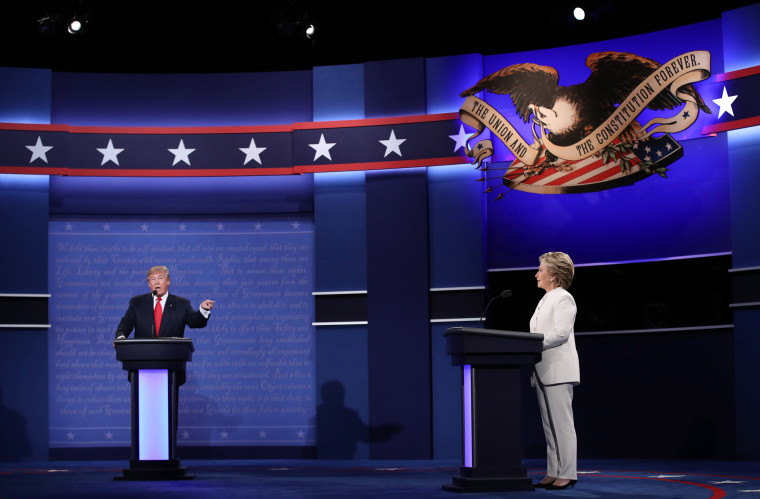LAS VEGAS — The days leading up to the third presidential debate were spent largely in the gutter, the latest chapter of this long and treacherous general election campaign between Hillary Clinton and Donald Trump. But in this final showdown, hosted by Chris Wallace of Fox News, the two candidates fit in a little bit of policy alongside their attacks on each other's weaknesses and scandals.
Related: Catch up on the debate here
At the University of Nevada, Trump, who has been badly trailing Clinton in polls, delivered a more focused performance than any of the previous debates. But an eye-popping comment he made questioning the legitimacy of the election will likely overshadow his other statements.
Here are our five major takeaways:
1. Trump Will Still Not Agree to Accept Election Results
Trump refused to say he would accept the outcome of the election on Nov. 8, after traveling the country for days insisting the process is "rigged."
“I will look at it at the time,” Trump told Wallace, eliciting a gasp from the audience in the debate hall and in the media filing center.
Clinton called Trump’s answer “horrifying” and said it was part of Trump’s pattern to play the victim and blame the system when he’s down.
She noted that after he called the outcome rigged after losing the Iowa GOP caucuses, and that when his television show didn’t win an Emmy, he blamed the system.
Trump didn’t deny but interjected that he should have won an Emmy.
2. Clinton Again Ties Trump to Russia
When Wallace asked Clinton about a statement she made in a paid speech about wanting an open hemisphere of open borders and open trade, Clinton quickly pivoted to WikiLeaks and evidence the Russian government is hacking emails to influence the election. Clinton's speeches were part of a wide release this week by the organization believed to be connected to Russia and its leader Valdimir Putin.
She reminded voters that Trump has actively encouraged Russia to commit espionage and that he hasn’t since acknowledge that the U.S. intelligence committee believes Russia is the culprit.
“The most important question of this evening,” Clinton said, is if Trump “rejects Russian espionage against Americans.” She also asked Trump to admit that Russia was responsible for the hacks.
He refused, insisting as he has at previous debates, that he’s not sure if Russia is culpable
Trump said that Putin “doesn’t respect” Clinton or President Obama and insisted anew that he doesn’t know Putin, which is counter to his previous claims. He noted again that Putin has “said nice things about me.”
Clinton said Putin would “rather have a puppet for president of the United States," prompting Trump to insist, "You're the puppet."
3. Trump Denies Allegations By Accusers
Trump denied the claims of the nine women who have come out in the past week alleging unwanted groping and sexual advances, saying falsely the claims had been “debunked.”
“I didn’t even apologize to my wife,” Trump said, “because I didn’t do anything.” That contradicted comments from his wife, Melania, earlier in the week, when she told interviewers he had apologized for boorish comments on the Access Hollywood video.
“Nobody has more respect for women than I do,” Trump added.
Clinton used the topic to make a broader appeal to women, noting that Trump’s denial had extended to attacking his accusers at campaign rallies and saying they’re not attractive enough for him to grope.
“Donald thinks belittling women makes him bigger,” Clinton said.
“This is pattern of divisiveness,” Clinton added, calling it a “a very dark and dangerous vision for our country.”
Trump pivoted from the allegations to invoke a video released this week by conservative activist James O’Keefe that claims that Clinton supporters were paid to incite violence at his rallies. The video has not been substantiated by NBC News.
At a Chicago rally earlier this year where numerous fights broke out, Trump said they were “possibly or probably started by her or her sleazy campaign.”
4. Trump Says the Mosul Operation is Political
Trump suggested that the new military operation to reclaim the Iraqi city of Mosul from ISIS was a political move by President Barack Obama to help Clinton.
Clinton, who says she supports the president’s decision, derided Trump’s claim.
“That’s how Donald thinks. He’s always looking … (for) conspiracy theories,” Clinton said.
She said that when she was watching the attack on Osama bin Laden, “he was hosting 'Celebrity Apprentice.'”
5. Clinton Suggested Trump Can’t be Trusted with Nuclear Weapons
Trump flatly denied he had ever suggested that countries like Japan could arm themselves with nuclear weapons, even though he had done so in a Fox News interview with Wallace himself.
Clinton said Trump's contradictions on that issue proved anew that Trump couldn’t be trusted with that responsibility for the U.S. nuclear arsenal.
“The bottom line on nuclear weapons is that when the president gives the order it must be followed,” Clinton said.
Trump noted he has the support of more than 200 military leaders and criticized the U.S. for slashing its nuclear arsenal.

